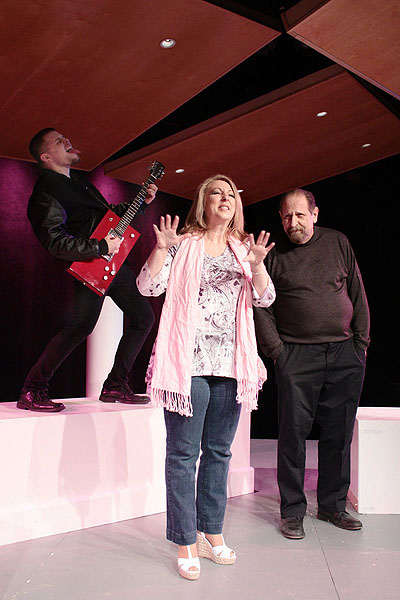
Motherhood Out Loud,” now staging at the Southampton Cultural Center through Sunday, March 24, explores the various roles and types of motherhood—from the happy, though painful moments of birth, to the heartache of death—and from the points of view of all types of mothers, including single, married and divorced moms, and those in typical nuclear families as well as mothers of the non-traditional variety.
Told in a series of 19 vignettes and monologues by a number of celebrated American writers, this body of work is at times funny, sad, heartrending and unpredictable, as is the role of motherhood itself. In this East End production, directed by Michael Disher, a cast of local actors—including Daniel Becker, Valerie DiLorenzo, Adam Fronc, Barbara Jo Howard, Kasia Klimiuk, Joan Lyons, Josephine Teresi-Wallace, Edna Winston and Susan Wojcik—take on the various roles with gusto.
The stories, which are fast-paced and entertaining, are set up in chapters—Fast Births, First Day and Sex Talk in Act One, and Stepping Out and Coming Home in Act Two—which roughly follow the progression of life.
The show opens with “Fast Births Fugue” by Michael Lowe and features three women—Ms. Teresi-Wallace, Ms. Lyons and Ms. Wojcik—on the precipice of giving birth. It’s not pretty, and there are plenty of curse words, but this short opening scene starts at the beginning, providing a starting point for the mostly chronological life thread to follow.
Chapter One’s “Fast Births” is all about beginnings. There’s the suffering, and the joy, that comes with motherhood; the sleepless nights (My baby’s a sleep terrorist,” Ms. Winston exclaims in “Next to the Crib” by Brooke Berman); and the next step, play dates and park visits (“Going to the park is like Dante’s Purgatory,” says Valerie J. DiLorenzo in “New in the Motherhood” by Lisa Loomer. “Not ‘Dante’s Inferno;’ that would be exciting.”).
Chapter Two’s “First Day” focuses on a child’s young life after babyhood. There is the story of 7-year-old Sammy, a boy who wants to wear girls’ clothes; a mother’s frustration at the often nosy and intrusive, though mostly well-meaning, questions about her adopted Chinese daughter; and how people react to surrogacy and gay parenting (“I never asked to be the poster boy for gay parenting,” exclaims Mr. Fronc in “If We’re Using A Surrogate, How Come I’m the One with Morning Sickness” by Marco Pennette.). This piece is the best written and most vividly told in “Motherhood,” in this reviewer’s opinion.
Chapter Three brings the mothers to the troubled and tormented teenage years with “Sex Talk.” In this series of scenes, the topics range from condoms, clitorises and training bras to the travails of stepmotherhood and first dates.
“I wonder if Michael’s as nervous about this date as I am?” ponders Ms. Howard as the mother in “Michael’s Date” by Claire LaZebnick.
Apparently, he’s not.
Chapter Four’s “Stepping Out” marks the beginning of Act Two and paints portraits of what happens to moms when their kids enter young adulthood. There’s the bargaining that comes seemingly hand-in-hand with high school graduation day (the kid who won’t go, the girl who wants to wear a bikini under her gown, the valedictorian who puts off writing his speech at the 11th hour); followed by the sudden realization that the children have left the nest for good on the first day of college; and then, of course, there’s wedding dress shopping.
One of the most moving scenes in “Motherhood” comes at the end of the Chapter Four. “Stars and Stripes” features Ms. Lyons as a mother whose son is on a tour of duty in Afghanistan. This piece, written by Jessica Goldberg, poetically captures the fear and worry that a mother of a child in the armed forces must face.
Chapter Five’s “Coming Home” brings the mothers to adulthood, and how their relationships change when their children have grown up. Territory covered here ranges from the battles that occur over holiday dinners, to what happens when the roles between parent and child become reversed, to the decisions the children make about having children themselves, and the unbreakable bond between mother and child.
A standout scene in Act Two occurs during “Elizabeth” by David Cale. Mr. Becker’s passionate portrayal of an adult son taking care of his mother in the early stages of dementia is heartbreaking.
The final scene in the show, “My Baby” written by Annie Weisman and acted by Ms. DiLorenzo, perfectly captures what it means to be a mother. It’s a Sisyphean task, filled with the good and the bad, and it never ends.
Bottom line: Diverse stories, well told, ensure that there’s a little something for everyone in this production of “Motherhood.”
“Motherhood Out Loud” stages at the Southampton Cultural Center on Thursdays at 7:30 p.m., Fridays and Saturdays at 8 p.m. and Sundays at 2:30 p.m., through March 24. Tickets are $22. For reservations and additional information, call 287-4377 or visit scc-arts.org.